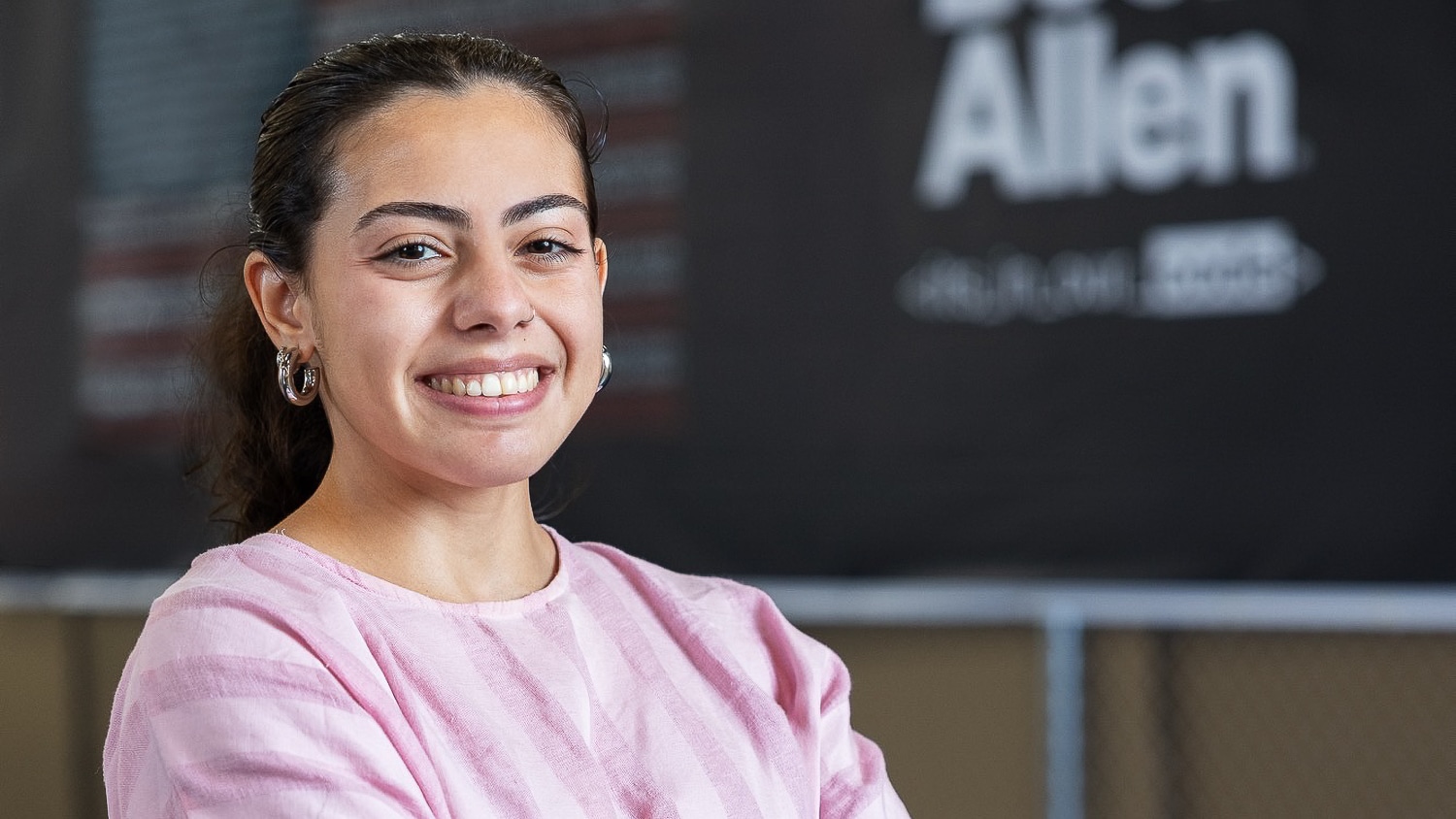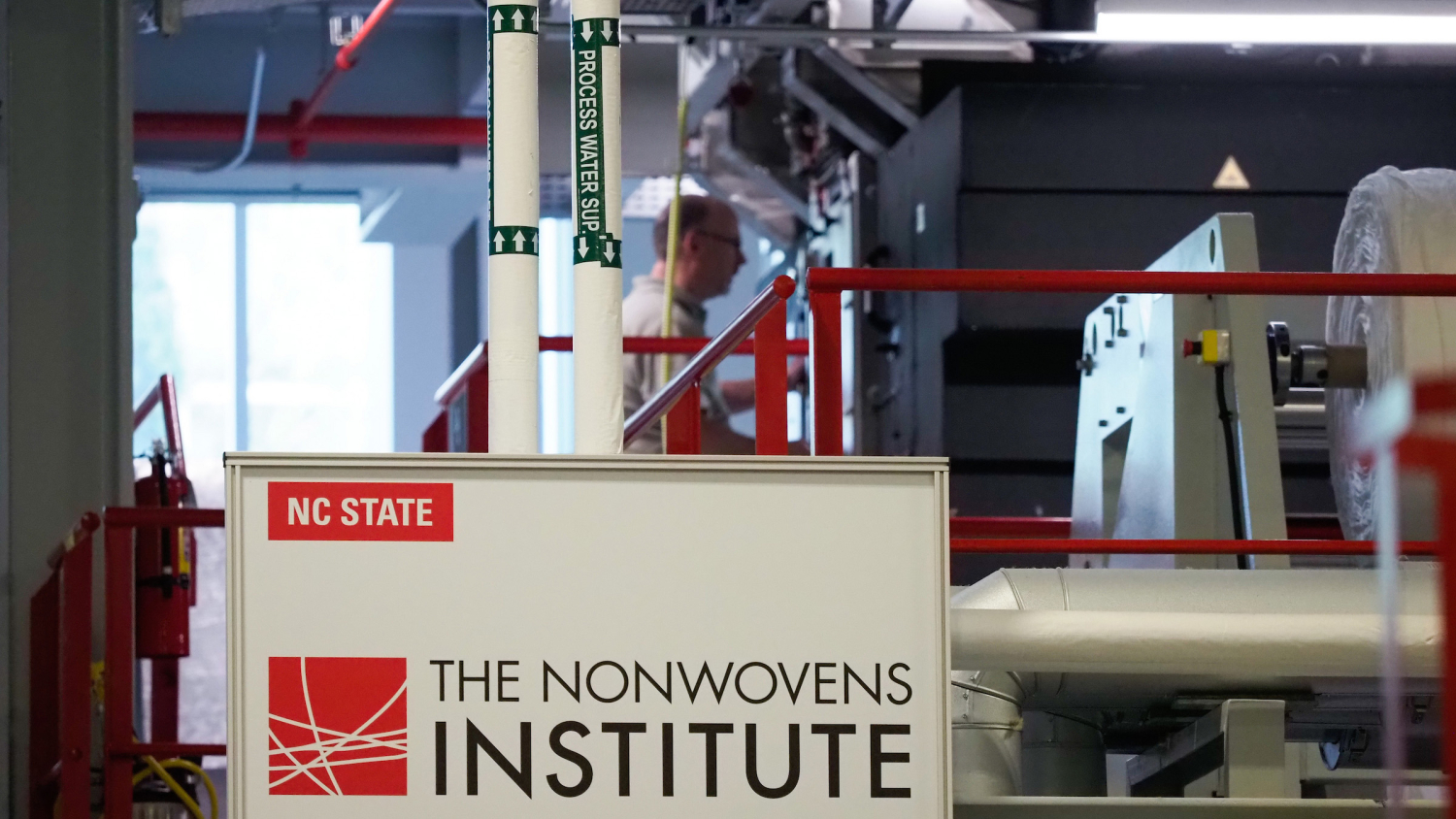Designing For Good: Seniors Transform Rice Bags into Solutions

By Sarah Stone
Seniors in the Wilson College of Textiles’ textile engineering (TE) and textile technology (TT) programs spent the first week of their semester creating solutions for real problems in developing countries through the Rice Bag Challenge.
The challenge? Transform two rice bags and up to $10 worth of outside material into an item that helps alleviate the day to day obstacles for residents in developing countries. Groups had one week to go from prompt to product.
Two officials with Rise Against Hunger, an international nonprofit that coordinates food packaging and distribution, visited Wilson College to judge the entries. Ultimately, nutrition technical designer Chelsie Kohlberg and programs manager Kristen Wassil chose a utility apron as the winning project.
“I thought it was multifunctional,” Kohlberg says. “I was envisioning the cooks in the kitchen at the school where I work, or even the farmers with their tools and their seeds, or just anybody out and about wearing it.”
This challenge serves as a sort of “test run” for the rest of Senior Design, a capstone course required for all senior TE and TT students. These same groups will spend the rest of the academic year developing a product sponsored by major brands such as The North Face and HanesBrands Inc.
“We want to really throw them into the design process and learn how to work as a team. We also get an idea of the types of ideas that they’re going to come up with,” Dr. Amanda Mills, interim co-director of Senior Design, says. “We want them to get their hands dirty and actually try and make something in prototype, so I heard some teams say that they made five different iterations, and that’s perfect. We want them to do that because that shows them it’s okay to not have a perfect first product, and it helps get them over the fear of not making a perfect version.”
Members of each of the winning Rice Bag Challenge teams explained their idea, the design process and what they learned.
First Place: Utility Apron

Where did your project idea or inspiration come from?
Rachel: We were trying to find a product that would make the biggest impact for people in developing countries and we noticed that the agriculture industry is prevalent.
Bailey: We were debating between an apron or a tool belt and so we each sketched what we thought of separately and then kind of combined them to figure out what exactly we wanted it to be and look like.
What was the design process like?
Rachel: Once we had a clear image of where we were going, it made it a lot easier to implement a lot of really good ideas that we had. When we came up with this hybrid idea of the utility apron, we used elements from all of our ideas together.
What did you learn?
Rachel: I learned how an effective team can be achieved with communication and working together. I really liked how we were able to kind of pull all our ideas together. We learned in our leadership seminar that leadership is a process, and I really agree with that. It’s not just one person.
How did you feel when you found out you placed in the top three?
Bailey: I was surprised. I felt like everyone had really good products.
How do you feel this sets you up for the rest of senior design?
Rachel: We got a preview of how we work together and our styles of group work, so I think it sets us up pretty well for the rest of the year.
Laura: I definitely agree with that. It’s nice to start out with a win.
Second Place: Hanging Planter

Where did your project idea or inspiration come from?
Emily: We were initially just thinking of some of the different needs in developing countries. Food insecurity was one that came up as a priority, and we want to look at things in a little bit of a different way compared to a lot of groups that were looking at rural areas. We wanted to see what the need is in some urban areas and started looking at food insecurity.
What was the design process like?
Jessica: We held a Zoom meeting where we brainstormed our ideas and put them all on the table. We ended up selecting the planter as our idea that was most feasible and best, and then we came up with an action plan of how we were going to design once we got in the lab.
Emily: One of the things that we took into consideration was the time constraint that we had. And so that played a big role in what we chose and how we designed it for sure. We tried to utilize as limited an amount of extra resources as possible, so it would be actually very feasible to be constructed at home. We only used the rice bag and thread, essentially.
Kayla: We had a couple of days where we were kind of toying with different ideas. But once we found one we liked, we really stuck with it. We planned out exactly how we wanted to do it. The construction only took us maybe three hours.
What did you learn?
Jessica: We definitely learned how we all work together best.
Emily: How we work together and what all of our strengths and weaknesses are.
How did you feel when you found out you placed in the top three?
Kayla: I think we all felt pretty confident in our projects. Not necessarily that we’d be first or second. We thought our design was very feasible and it’d be very useful in a lot of these urban environments. So that I think we already felt, you know, really good about it, right from the get go, whether we placed or not we were happy with it.
How do you feel this sets you up for the rest of senior design?
Emily: I think it was kind of good to have this small kind of test run. First, because it was every step that we would be taking throughout the semester but compressed. So it was kind of a short snippet of the research process ideation all the way through to completion and presentation.
Jessica: I feel awesome about the work, and it’s a great confidence boost for the rest of the year.
Third Place: Cot

Where did your project idea or inspiration come from?
Jacqueline: We all made lists of ideas. One of the things that I put down was that countries, especially in cases of natural disasters, especially with COVID and high amounts of hospital beds in use, run out of hospital beds. They need somewhere to sleep. I really got the inspiration from Haiti, because I was listening to a podcast and I heard that so many people were not living in their homes because their homes were either collapsed or not stable [due to an earthquake on August 25, 2021], and so they’re sleeping outside.
What was the design process like?
Brandon: The cot itself, like the top part of the bed, wasn’t too big of an issue. We knew we wanted to sew that together, so Jacqueline went ahead and got all the sewing done. She was the most experienced with all the machines.
Chris and I started working on the actual frame of the bed itself because we knew what we wanted it to look like, at least to a certain degree. We had to shrink the original frame down a little bit, just so that we got the right tension on the top part of the bed.
When we put any weight on it, it would sag in the middle way too much, so Chris and I added two more legs to the middle section, and then we started sewing everything together and getting the actual bags secured to the frame.
Jacqueline: Chris came up with the idea that we actually did, which was we used yarn and made a grid-like system on the bottom to keep it from sagging too much.
What did you learn?
Brandon: I learned that communication is probably our best friend throughout all of this. As long as we face every problem together, we can come up with a solution super easily.
How did you feel when you found out you placed in the top three?
Jacqueline: We hadn’t seen anyone else’s projects yet. We were one of the first people the judges saw.
Chris: I was definitely shocked as well because all the other projects we saw, we were like, “Man, that’s a great idea. We should have thought of something like that.”
How do you feel this sets you up for the rest of senior design?
Chris: I learned that when we come together, I just feel like our group had a sense of we know when to step up, we know when to listen to each other, and there’s no one specific leader in our group.
- Categories:


